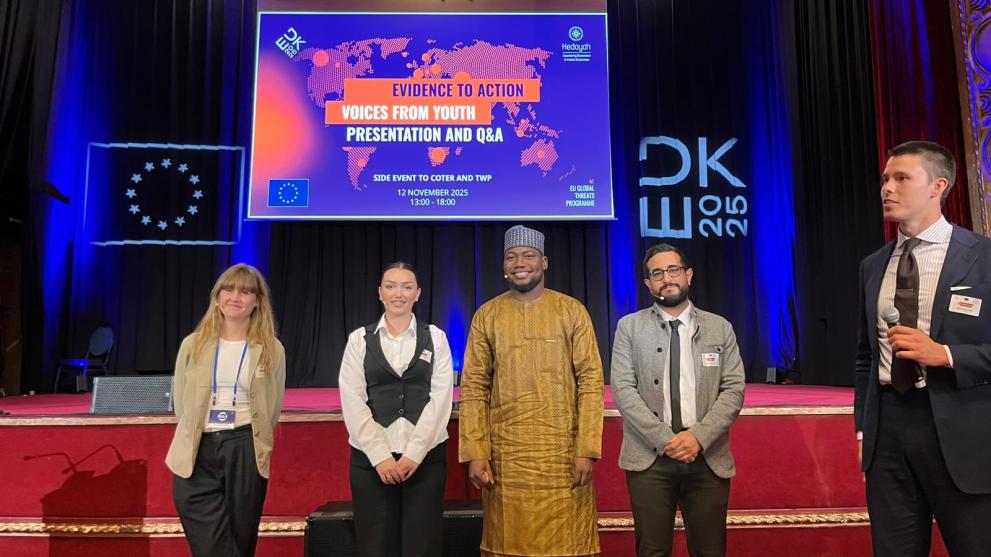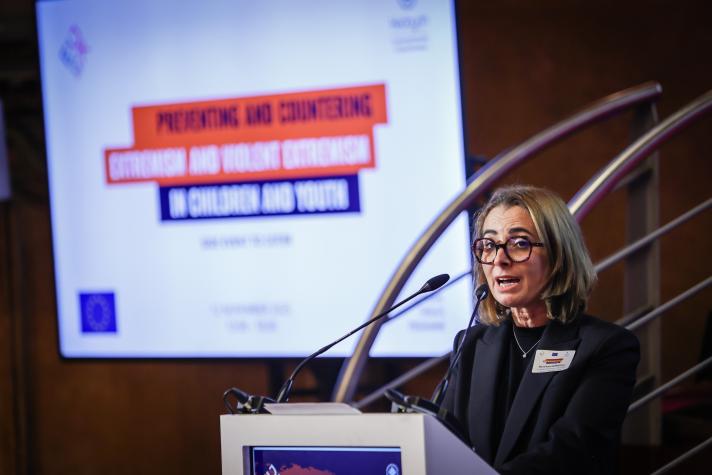
Against the backdrop of evolving global security challenges, preventing the radicalisation of children and youth has become a growing priority for the European Union and its partners. An increasingly hybrid and interconnected landscape requires practitioners, policymakers, young experts, and other actors to come together to develop nuanced, sustainable responses to counter extremism and violent extremism.
The European Commission’s Service for Foreign Policy Instruments, in collaboration with the Danish Presidency of the Council of the European Union and EEAS, co-hosted the event Preventing and Countering Violent Extremism in Children and Youth in Brussels. Held alongside the meetings of the Council’s Working Party on Terrorism (International Aspects – COTER) and the Terrorism Working Party (TWP), and following Hedayah’s annual Research Conference 2025 (RC25), the event brought together researchers, experts and delegates to discuss lessons and challenges in light of the evolving nature of violent extremism.
The event offered a platform to connect research with experiences from the field: it combined insights from RC25 presentations, experiences from young beneficiaries and active participants in PCVE programmes both in Europe and abroad. The event allowed to engage with key EU partners and programmes, and the Danish approach to preventing child and youth radicalisation.
“One of the most pressing challenges we face on CT/PCVE, globally also very much in Europe, is the alarming radicalisation of children and youth. Through this event, we wanted to offer a platform to connect research with lessons from experience and address the challenges in this evolving landscape. We wanted to specifically take the time to listen to the voices of youth themselves, they hold the key to solutions through their mobilisation.
Bringing together colleagues from the EU institutions and delegates from COTER and TWP allows to share many perspectives and to identify both priorities and needs as well as possible solutions. We know these issues are complex and dependant on many different factors, and quick fixes are not the answer.“
Maria Rosa Sabbatelli, Head of Unit, FPI.1 Global and Transregional Threats and Challenges.
Discussions explored how education, digital spaces, and community engagement can reduce vulnerabilities and strengthen resilience and strengthen resilience against violent extremism among children and youth. Interactive sessions allowed participants to identify challenges, emerging needs, and effective prevention practices, including early intervention strategies, community-based initiatives, and approaches to reinforce protective factors.
Complementing the discussions, a project exhibition showcased four EU-funded initiatives: STRIVE GCERF, STRIVE Hedayah, STRIVE Juvenile, and the EU Knowledge Hub on Prevention of Radicalisation. These projects are a testament to how research and locally-led solutions contribute to sustainable prevention strategies in the radicalisation of children and youth within and outside Europe.
Youth Voices in Action: Interactive Talks on Countering Extremism and Violent Extremism
A dedicated youth session, Evidence to Action - Voices from Youth, highlighted the role of young people as active partners in countering extremism and violent extremism. Young leaders and community representatives from Nigeria, Kosovo*, Tunisia, and Denmark shared their experiences as youth participants and/or beneficiaries from EU programmes in Europe and beyond.
Delivered in short, punchy TED-talk formats, their interventions illustrated the practical impact of youth-led initiatives, the value of incorporating young voices in policy and programming, and the potential of youth perspectives to inform future prevention strategies.
"Extremism grows in the distance but collapses when human contact is created".
Fjolla Hasani, GCERF beneficiary and youth leader from Mitrovica, Kosovo.
By combining research, field experience, interactive dialogue, and youth perspectives, the side event reinforced the EU’s commitment to evidence-based, locally informed strategies for preventing and countering extremism and violent extremism among children and youth.
More information on the European Union’s efforts to support prevention and counter-terrorism initiatives can be found on the Service for Foreign Policy Instruments (FPI) website and here .
*This designation is without prejudice to positions on status, and is in line with UNSCR 1244/1999 and ICJ Opinion on the Kosovo declaration of independence.
Details
- Publication date
- 13 November 2025
- Threat area
- Counter-Terrorism, Prevention of Violent Extremism


